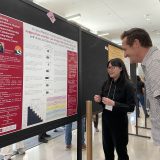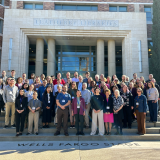Marco Bisoffi: Thinking Outside the Tumor on The Academic Minute
April 29, 2014
Dr. Marco Bisoffi
‘s research into “field cancerization” was featured on WAMC’s
The Academic Minute.
His research widens the view of cancer treatment to include the tissues in areas
surrounding
tumors.
Bisoffi is associate professor of
biological sciences
at Chapman University with joint appointments at Schmid College, Crean College of Health and Behavioral Science and School of Pharmacy.
If you missed the live broadcast of Bisoffi’s
The Academic Minute
, its audio & transcript can be found below (courtesy of
AcademicMinute.org
).
Transcript:
The term field cancerization denotes the presence of molecular aberrations in tissues that are adjacent to solid tumors. These aberrations can include genetic changes such as gene mutations, or biochemical changes, such as overexpression of growth factors and enzymes. It is important to note that these changes occur in phenotypically normal cells that are part of histologically normal tissues surrounding overt cancer lesions. In addition, these aberrations often affect entire tissue fields that are located centimeters away from the visible tumor margins, which, from a cellular point of view, is a large distance.
It is not entirely clear how such fields form. For example, the question of whether the tumor induces the field, or whether the field gives rise to the tumor, or both, remains unanswered. However, regardless of the answer, both researchers and clinicians alike agree that field cancerization has important implications for the diagnosis and treatment of cancer.
In oncology, the histological assessment of tissues by trained pathologists remains the gold standard of cancer diagnosis and prognosis. Field cancerized tissues are typically recognized as normal, which for example can lead to false-negative biopsies and over-conservative surgical margins geared towards organ-sparing treatments. However, delayed treatment and/or left-behind field cancerized tissue may lead to tumor recurrences.
Our research deals with studying markers of prostate field cancerization, a type of cancer newly diagnosed in 200,000 and killing 30,000 men in the United States every year. In particular, we are investigating molecular mechanisms, or pathways, of prostate field cancerization in human cell models. We also test distinct mediators of field cancerization for their value as accurate diagnostic biomarkers in human prostate tissues.
Visit AcademicMinute.org for fascinating research featured every day.
About Dr. Marco Bisoffi
Dr. Bisoffi was originally trained in molecular and cell biology, and in biochemistry as applied to projects concerned with the molecular characterization of the cuticle of nematode parasites of human medical importance at the Swiss Tropical Institute of the Faculty of Natural Sciences at the University of Basel in Basel, Switzerland.
After graduation, Dr. Bisoffi changed his field of research to molecular cancer research. His research during this time was concerned with the molecular profiling of breast tumor vasculature, molecular mechanisms of prostate cancer progression, and the molecular mechanisms of carcinogenesis in mast cell tumors.
In 2002, Dr. Bisoffi became a Faculty Member in the Department of Biochemistry and Molecular Biology of the University of New Mexico Health Sciences Center in Albuquerque, New Mexico, USA. In this capacity he established several research programs focused on the molecular mechanisms underlying prostate and breast cancer, the discovery and validation of biomarkers of early and progressive disease in these two type of hormone-dependent solid tumors, as well as the screening, identification, and testing of natural product based anti-prostate cancer organic small molecules and the elucidation of their mechanism of action.
In 2013, Dr. Bisoffi joined the Schmid College of Science and Technology at Chapman University as an Associate Professor of Biological Sciences, where he pursues some of the projects developed at the University of New Mexico.



